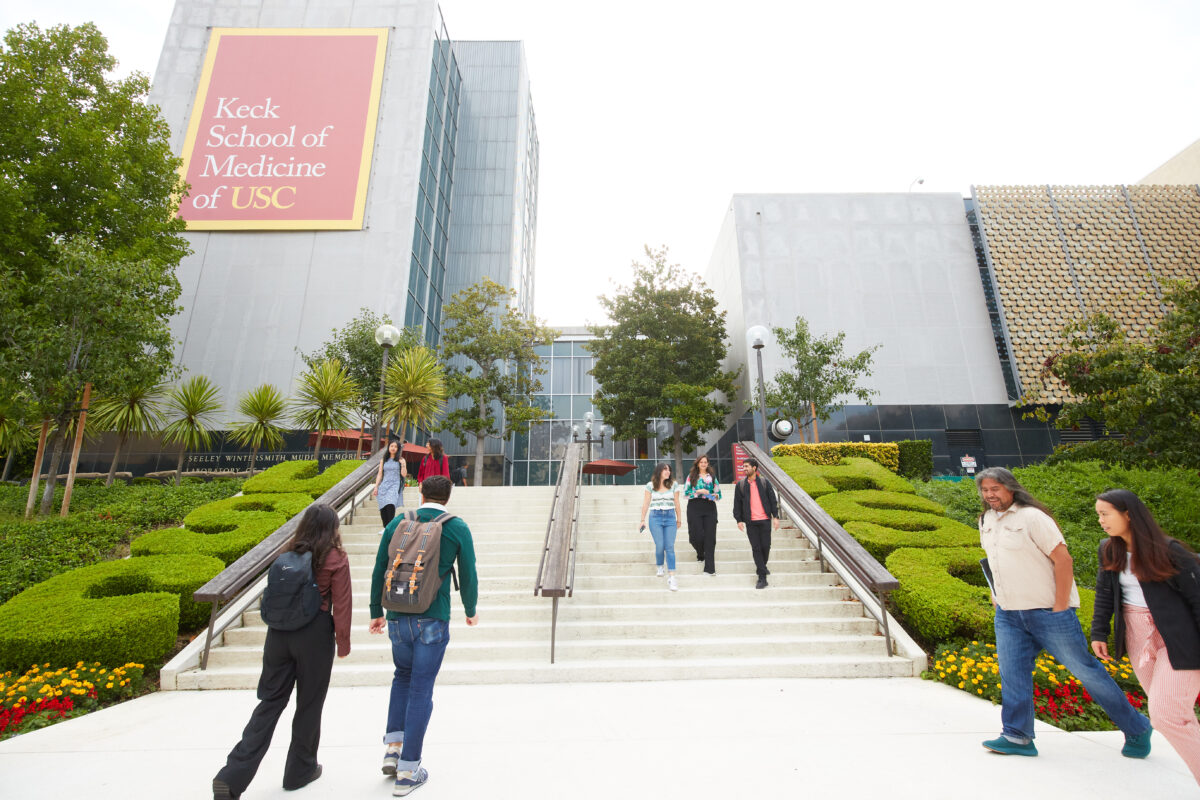
This year, philanthropic giving supported scholarships for nine students in USC’s master of science (MS) program in stem cell biology and regenerative medicine. Launched in 2014 as one of the only programs of its kind in the United States, the MS program has graduated more than 300 alumni who have entered medical and PhD programs and pursued successful careers in academia, the biotech and pharma industries, and beyond.
“Scholarships have changed lives and opened doors for so many of our students over the years,” said Francesca Mariani, faculty director of the master’s program. “The support of the Keck School Dean’s Office, the Hearst Foundations, and our generous donors has enabled us to welcome the best and brightest and we are grateful for their vision and unwavering dedication to our students’ success.”
Dean’s Fellowship
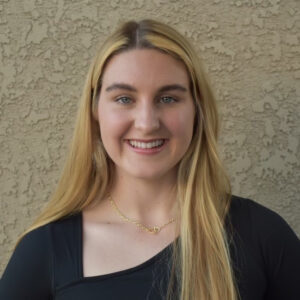
Isabella MacLean-Cariello completed a bachelor’s degree in biochemistry at the University of Idaho while competing on the Division I swim team.
As an undergraduate, she gained lab experience performing chemical tests on archaeological artifacts with Ray von Wandruszka’s lab, and studying the drug metformin’s anti-aging properties in killifish with Adam Jones’ lab.
She has volunteered as an officer of the Women in Science Society and as a notetaker at the Center for Disability Access and Resources at the University of Idaho, and as a science fair judge at McDonald Elementary School. She has also interned with Pathways Hospice, and worked as a first aid-, CPR-, and AED-certified swim instructor.
While pursuing her master of science in stem cell biology and regenerative medicine, she joined Gage Crump’s lab and developed a strong passion for pursuing craniofacial research from a clinical perspective. She plans to earn either a DDS or an DDS/PhD, and pursue a faculty career. She is deeply committed to educating and informing others, a passion rooted in her upbringing in a two-mother household.
“Hard work and dedication have never been fearful words to me,” she said. “I enjoy being able to try and answer questions that would benefit the greater good.”
Cardinal Fellowship

Becca Samuels graduated with a bachelor’s degree in environmental biochemistry from the University of California, San Diego (UCSD).
As an undergraduate, she worked in three labs: studying inorganic chemistry in Guy Bertrand’s lab and Streptomyces bacteria at Pieter Dorrestein’s lab at UCSD, as well as organometallic chemistry in Paula Diaconescu’s lab at UCLA.
She also founded UCSD’s chapter of WE CARE, an organization that supports women’s education in India, volunteered at her local foodbank Pathways of Hope, and provided childcare at her church.
After completing the first year of USC’s stem cell master’s program, she will complete a second-year thesis in Tom Lozito’s lab, which studies tail regeneration in lizards and salamanders.
Her interest in becoming a physician-scientist dedicated to stem cell research was inspired by her mother’s battle with liver disease.
Choi Fellowship
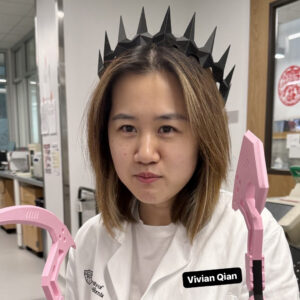
Qiyi (Vivian) Qian majored in neuroscience and minored in chemistry at Smith College.
She gained research experience as a PhD student at Okinawa Institute of Science and Technology (OIST) in Japan. Seeking better alignment with her academic interests, she left the PhD program and took a job as a research assistant studying molecular imaging in brain disease research in Yichi Su’s lab at Fudan University in Shanghai.
She’s currently applying her research experience with biosensors and live cell imaging in Peter Yingxiao Wang’s lab at USC.
After graduating with a master of science in stem cell biology, Qian will begin USC’s PhD program in biomedical engineering.
“USC’s stem cell master’s program provided me with a precious opportunity to join a lab early in the academic year, so I was able to showcase my strength as a researcher and receive an offer to join the PhD program,” she said.
Dhablania-Kim Fellowship
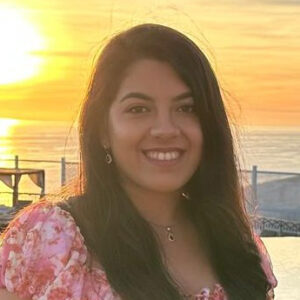
Sahar Lavian is a first-generation college graduate who earned her bachelor’s degree in biopsychology from the University of California, Santa Barbara.
She volunteers at her synagogue and with the Gift of Life bone marrow donor registry, helping patients with blood cancers.
“My dream is to find a cure for Parkinson’s disease,” she said. “After receiving my master of science in stem cell biology and regenerative medicine, I plan to work in a lab to eventually join a PhD program or a company researching cures for neurodegenerative diseases.”
Hearst Foundations Scholars

Danielli Cavallo graduated with her bachelor’s degree in biology from Pepperdine University.
While at Pepperdine, she conducted an undergraduate honors thesis on the impact of plastic particles on the cell stress response. As she explored cellular stress and deepened her academic focus, she became increasingly interested in the therapeutic potential of stem cells.
Outside the lab, she remained active in the community, supporting events for children through the Cornucopia Foundation and assisting patients and healthcare staff as a UCLA Care Extender.
After completing USC’s stem cell master’s program, Cavallo would like to attend medical school and become a physician-scientist with a research interest in stem cell biology.
“Stem cell research has the power to revolutionize the treatment of diseases and injuries,” she said, “and obtaining an advanced degree in this field is integral to my goal of becoming a contributing researcher and practitioner.”
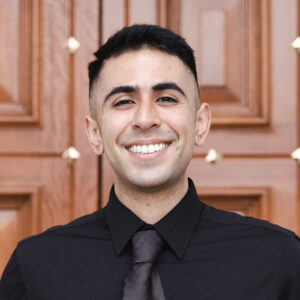
Samuel Corona is a first-generation college graduate who received his bachelor’s degree in psychology from Loyola Marymount University (LMU). After obtaining his emergency medical technician (EMT) license from UCLA, he volunteered nearly 1,400 volunteer hours providing emergency care to students, faculty and visitors at LMU.
He also worked with Lifeline ambulance and currently serves patients in the emergency room at Kaiser Permanente, which has taught him both the power and limitations that language holds in medicine.
As a student in USC’s stem cell master’s program who will complete a second-year thesis, he has maintained a 4.0 GPA and is conducting research in Unmesh Jadhav‘s lab, studying how intestinal stem cells can aid tissue regeneration in chronic inflammatory diseases.
Corona’s commitment to medicine is deeply personal.
“As a child, I lived through the fear of watching my mother’s severe asthma attack while no person on her care team could understand our language,” he said. “That moment of fear contributed to my dream of becoming an anesthesiologist and a critical care physician—someone who not only heals, but also has the capacity to communicate and advocate for patients that are scared and otherwise believe obtaining care is inaccessible for them. One of the foundational steps any aspiring physician or healthcare worker should endeavor to take is ensuring they work with and understand the needs of their community.”
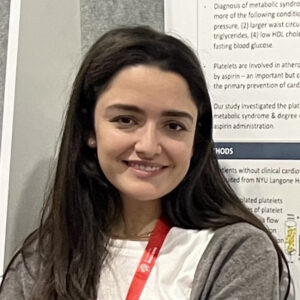
Maria-Teresa Mata Vivas received her bachelor’s degree in philosophy and completed a pre-med baccalaureate program at New York University (NYU). She conducted research about metabolic syndrome in Jeffrey Berger’s lab under Michael Garshick at NYU Langone Medical Center. She also founded and runs the nonprofit Project Junior, which distributes medicine and supplies to children in Venezuela.
After college, she worked as a financial analyst at a boutique investment firm, where she conducted market research on pharmaceutical companies and biotechnology investment funds.
During her undergraduate years, she overcame significant health challenges, and is looking forward to leveraging her business and research experience to pursue a career in biotechnology.
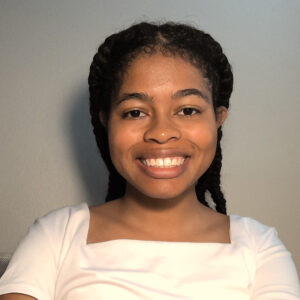
Harmony Whiting earned her bachelor’s degree in molecular biology from California State University, Northridge (CSUN).
She served as a research assistant at CSUN’s HOMME Lab, which focuses on community-partnered participatory approaches to supporting birthing persons and their families. She has also performed research related to the correlations between maternal stress levels and breast milk production.
She aims to pursue research to improve the detection and treatment of uterine fibrosis as well as ovarian and uterine cancers.
Whiting’s passion for women’s health, caregiving and community engagement is rooted in her upbringing in a single-parent household.
“Living with my grandparents, who are deaf, and my mother, a person with cerebral palsy, has provided me with invaluable lessons in patience, effective communication, and empathetic caregiving,” she said. “I am committed to using my education to give back, to advocate for those facing similar challenges, and to contribute positively to my field and beyond.”
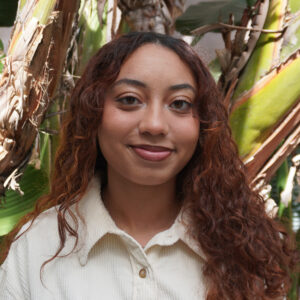
Tianna Young is a first-generation college graduate who received a bachelor’s degree in marine biology from San Jose State University (SJSU).
Her research experience spans studying heart muscle cells in rats, carbon accounting in trees, and seabird ecology, as well as synthesizing scientific concepts for non-science majors. She also won the Doris A. Howell CSUPERB Research Scholar Award, which funds undergraduate research projects related to women’s health.
She has volunteered with the American Cancer Society in Watsonville and with the Puente Program at her high school, mentoring students from underrepresented backgrounds in low-income communities to pursue higher education. At SJSU, she also participated in the Society for the Advancement of Chicanos/Hispanics and Native Americans in Science (SACNAS) and the National Science Foundation’s Louis Stokes Alliances for Minority Participation (LSAMP) program.
As a student in USC’s stem cell master’s program who will also complete a second-year thesis, she is studying neurodegenerative diseases in Marcelo Pablo Coba’s lab at the Zilkha Neurogenetic Institute.
“To make a difference in the lives of others is not only a passion of mine, but also a drive in the type of research I want to be a part of,” she said. “I am interested in learning how regenerative medicine can be used to address some of the most pressing health challenges, and I aspire to contribute to future medical innovations through stem cell research.”
